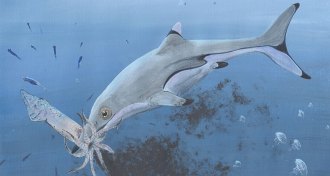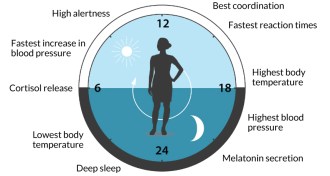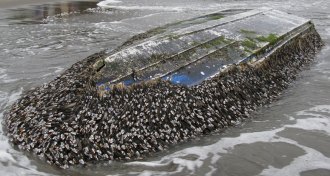Life
Sign up for our newsletter
We summarize the week's scientific breakthroughs every Thursday.
-
 Life
LifeLena Pernas sees parasitic infection as a kind of Hunger Games
In studies of Toxoplasma, parasitologist Lena Pernas has reframed infection as a battle between invader and a cell’s mitochondria.
-
 Neuroscience
NeuroscienceKay Tye improvises to understand our inner lives
To figure out how rich mental lives are created by the brain, neuroscientist Kay Tye applies “a new level of neurobiological sophistication.”
-
 Anthropology
AnthropologyChristina Warinner uncovers ancient tales in dental plaque
Molecular biologist Christina Warinner studies calculus, or fossilized dental plaque, which contains a trove of genetic clues to past human diet and disease.
-
 Health & Medicine
Health & MedicineLuhan Yang strives to make pig organs safe for human transplants
A bold approach to genome editing by biologist Luhan Yang could alleviate the shortage of organs and ease human suffering.
-
 Paleontology
PaleontologyA baby ichthyosaur’s last meal revealed
A new look at an old fossil shows that some species of baby ichthyosaurs may have dined on squid.
-
 Paleontology
PaleontologyA baby ichthyosaur’s last meal revealed
A new look at an old fossil shows that some species of baby ichthyosaurs may have dined on squid.
-
 Life
LifeCracking the body clock code wins trio a Nobel Prize
Circadian clock researchers take home the Nobel Prize in physiology or medicine.
By Tina Hesman Saey and Aimee Cunningham -
 Life
LifeBody clock mechanics wins U.S. trio the Nobel Prize in physiology or medicine
The cellular mechanisms governing circadian rhythms was a Nobel Prize‒winning discover for three Americans.
-
 Oceans
OceansCastaway critters rafted to U.S. shores aboard Japan tsunami debris
Researchers report finding 289 living Japanese marine species that washed up on American shores on debris from the 2011 East Japan earthquake and tsunami.
-
 Genetics
GeneticsA mutation may explain the sudden rise in birth defects from Zika
A mutation in a protein that helps Zika exit cells may play a big role in microcephaly.
-
 Climate
ClimateTropical forests have flipped from sponges to sources of carbon dioxide
Analyses of satellite images suggest that degraded forests now release more carbon than they store.
-
 Genetics
GeneticsAncient boy’s DNA pushes back date of earliest humans
Genes from South African fossils suggest humans emerged close to 300,000 years ago.
By Bruce Bower